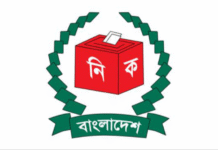Nagad in tussle with the Bangladesh Bank and the Bangladesh Post Office over its overdue loan of Tk317 crore taken against customer money

Bangladesh Post Office lists Nagad as its mobile financial service (MFS) provider and Nagad on its part claims that it is the digital transaction service of Bangladesh Post Office. It mentions the Bangladesh Post Office in all its communication materials.
Now a financial burden of Tk317 crore overdue loan taken by Third Wave Technologies, Nagad’s technology partner, from the Exim Bank has surfaced putting the post office in hot waters as the Bangladesh Bank is asking the post office to adjust the loan by September this year to meet up the shortfall in Nagad’s account.
The central bank issued a temporary licence to run a mobile financial service to the post office and Nagad is operating under that temporary licence.
Tanvir Ahmed Mishuk is the managing director of both Third Wave Technologies and Nagad.
Electronic money (e-money) means electronically stored monetary value issued against its real money balance, which can be used as a mode of payment.
The Bangladesh Bank first raised the issue of the loan taken against Third Wave Technology, also owned by Nagad’s Managing Director Tanvir Ahmed Mishuk, when the post office applied for extension of its temporary licence for the fifth time.
Meanwhile, of the total loan, Tk317 crore became overdue, and Exim Bank informed the Bangladesh Bank of the matter, saying that Third Wave Technologies did not pay their overdue even after repeated calls.
The Bangladesh Bank forwarded the letter to the Bangladesh Post Office, asking it to meet up the shortfall as per MFS licence condition.
The Bangladesh Post Office, on 10 April, wrote to Tanvir Ahmed Mishuk to take necessary measures to meet up the shortfall of Tk317 crore in the trust fund.
When Tk317.60 crore of the total loan amount became overdue, Exim Bank adjusted that money in March this year from the trust fund given by Nagad as security for the loan.
After encashment of the due loan amount by Exim Bank, Nagad on 5 April requested Bangladesh Bank to take action against Exim Bank, terming the loan adjustment unlawful and demanded justice.
In response to that, the Bangladesh Bank, in a letter to Nagad on 16 May, said that taking loan against public money by Third Wave Technologies was a clear violation of the central bank rule. Nagad was informed about the violation and was instructed to take necessary steps but they did not follow the instructions.
Hence, the loan adjustment issue was completely the matter of the relevant bank, the Bangladesh Bank has nothing to do with it, the letter mentioned.
Mohammed Haider Ali Miah, managing director of Exim Bank, said they encashed the deposit lawfully after the loan became overdue.
According to the loan condition, banks can adjust the loan on the maturity of the deposit kept as security, he said.
“We have adjusted the loan taking permission from the Bangladesh Bank,” he said.
After the overdue loan adjustment, the trust fund of Nagad is in deficit of Tk 317.60 crore which means Nagad’s e-money balance is greater than its real money.
According to trust fund guidelines, the balance of the fiat money fund must be equal to or greater than e-money at the end of every day.
If there is any shortfall in the trust fund, the service provider shall deposit the required amount to correct the same.
As the loan created a deficit in the trust fund of Nagad, the Bangladesh Bank asked the post office to adjust the loan by September this year to meet up the shortfall of public money.
In a letter to the Bangladesh Post Office, the central bank said that Third Wave Technologies has taken loans using public money as security resulting in a shortfall in real money than e-money which is a clear violation of Bangladesh Mobile Financial Services (MFS) Regulations, 2018.
Despite the risky operation of Nagad, the central bank extended the interim licence period considering their request and at the interest of customers, the letter said.
However, the condition of the licence is that the Bangladesh Post Office has to adjust the loan within one year or owners of the entity will deposit their own money to meet up the shortfall of public money.
Bangladesh Post Office will be solely responsible for meeting the shortfall until Third Wave Technologies free from lien the deposit amount given as security to the Exim Bank, according to the letter.
This shortfall means Nagad has virtually created more e-money than real money kept in customers’ trust fund account. The rule is to balance the e-money created with real money to keep inflation in check.
Now the Post Office is under the burden of making up the shortfall of Tk317.60 crore, as the Bangladesh Bank has all along held the Post Office responsible for all liabilities of Nagad because the MFS licence was issued in the name of the Post Office.
The licensing issue of the Bangladesh Post Office’s mobile financial service is also a bit complicated. According to the regulations, an MFS company cannot exist on its own but has to be a subsidiary of another financial institution or government entity. For example, bKash is a subsidiary of Brac Bank and Rocket of Dutch-Bangla Bank.
To get a full licence, the Bangladesh Post Office has to form a company to run Nagad as its subsidiary. Despite being given five extensions, the last of which is to end on 30 September, Nagad could still not become a subsidiary of Bangladesh Post Office.
Under this situation, since Nagad as an MFS cannot operate alone, it has applied to the Bangladesh Bank to operate as a non-bank financial institution under which it will work as a subsidiary to legalise its operation.
Commenting on the situation, Mustafa Jabbar, minister for Posts and Telecommunications, told The Business Standard on Wednesday, “Bangladesh Post Office does not own Nagad and is not going to take any stake in it.” Now the Post Office does not want to own Nagad with which it shares 51% revenue.
He said Bangladesh Post Office does not operate Nagad, it has no ownership in it and no post office employees work with Nagad.
Explaining the relation with Nagad, he said the company only shares revenue with the Bangladesh Post office.
BB curtails Nagad’s operation
Bangladesh Bank suspended Nagad’s new merchant acquiring activities until meeting the shortfall of public money.
Later, Nagad filed a writ petition against the Bangladesh Bank for its inaction against Exim Bank instead of meeting up the shortfall of public money.
In the petition, Nagad made seven officials from the top tier of the central bank respondents.
Petitioner in its writ petition filed on 18th May said that Bangladesh Bank has failed to take action against Exim bank for its unlawful encashment of term deposits that was given as the security of the loan.
The respondents include: The governor; the deputy governor, banking regulation and policy department; the deputy governor, payment systems department; the deputy governor, department of banking inspection-7; the executive director, banking regulation and policy department; the executive director, payment systems department; and, the general manager, department of banking inspection-7.
Nagad is in denial
Though Nagad is in trouble with the loan of Tk 317 crore, it had denied taking the loan previously when The Business Standard published a report in this regard.
In a rejoinder sent to the Business Standard on 29 June 2021 Nagad referred to a report titled “Nagad does not meet licence conditions for a third time” mentioning that Nagad Ltd. hasn’t adjusted loans was an untrue statement and therefore needed to be corrected.
How Nagad grew so fast
From the beginning of its journey, Nagad branded itself as a government backed MFS provider which helped it to gain customers faster.
Tanvir Ahmed Mishuk is the shareholder of Nagad on behalf of Sigma Group which has majority investment in the MFS provider. Mishuk is also a board member of Sigma group.
At a discussion with journalists on 23 March 2021, Tanvir Ahmed Mishuk explained the ownership issue of Nagad, saying that the venture started with the Bangladesh Post Office under a revenue-sharing model.
In the model, Nagad would share only revenue with the government. But they now have to adopt the shareholding model as per the MFS guidelines to get a licence from the Bangladesh Bank.
In the shareholding model, the Bangladesh Post Office will get 51% ownership, he said.
“We are facing some difficulties in the shareholding process because the company now is in losses. So, the Bangladesh Post Office has to take a share of the losses. Previously, they would get income from Nagad as per the revenue-sharing model,” he said.
On the other hand, taking ownership by a government organisation is a long process, which is delaying the licensing, he added.
Nagad is a fast-growing company that became the second largest MFS by achieving 53 million customers within just two years and a quarter after it started its journey. The daily transaction of the company is Tk 700 crore, according to the MFS website.
As a government backed MFS provider, Nagad gained customers faster by operating government transactions.
For instance, in FY21, the government disbursed Tk5,065 crore under the social safety net programmes through MFS operators, of which 75% was disbursed by Nagad.









